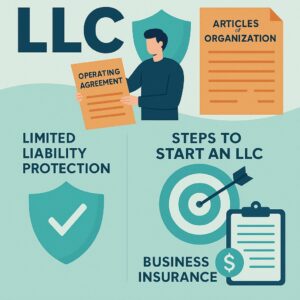
Starting a business can be both exciting and overwhelming, especially when deciding on the right structure. One of the most popular choices for entrepreneurs is forming a Limited Liability Company (LLC). An LLC combines the flexibility of a partnership with the liability protection of a corporation, making it an appealing option for small business owners. If you’re considering starting an LLC, here’s everything you need to know.
What is an LLC?
A Limited Liability Company (LLC) is a business structure that provides personal liability protection to its owners, known as members. This means that the members’ personal assets are generally protected from business debts and legal claims. Unlike corporations, LLCs offer simpler management structures and fewer formalities, making them easier to operate. Additionally, LLCs provide flexibility in taxation, as profits can be taxed either as a pass-through to members or at the corporate level, depending on your choice.
Benefits of an LLC
- Limited Liability Protection: One of the primary advantages of an LLC is that it separates personal and business liabilities. If the business faces lawsuits or debts, your personal assets like your home or savings are typically safe.
- Flexible Tax Options: LLCs can choose how they’re taxed. By default, a single-member LLC is taxed as a sole proprietorship, and multi-member LLCs are taxed as partnerships. However, you can also opt for S-Corporation or C-Corporation taxation for potential tax benefits.
- Simplified Management: Unlike corporations, LLCs aren’t required to have a board of directors or annual meetings. Members can manage the business directly or appoint managers to handle operations.
- Credibility and Professionalism: Operating as an LLC can lend credibility to your business, showing clients and partners that you have a formal business structure in place.
Steps to Start an LLC
- Choose a Business Name: Your LLC’s name must be unique and comply with state regulations. It should also reflect your brand identity.
- File Articles of Organization: This document, submitted to your state, officially registers your LLC. It typically includes your business name, address, and details about the members.
- Create an Operating Agreement: While not always required, an operating agreement outlines ownership percentages, member roles, and operational procedures. This is especially helpful for multi-member LLCs.
- Obtain Necessary Licenses and Permits: Depending on your industry and location, you may need state or local licenses to operate legally.
- Get an EIN: An Employer Identification Number (EIN) from the IRS is required for tax purposes and to open a business bank account.
- Consider Business Insurance: Protecting your LLC with the right insurance is critical. Policies can cover liability, property damage, and employee-related risks. Exploring options for business insurance for LLC is highly recommended to safeguard your investment.
Maintaining Your LLC
After forming your LLC, you must comply with ongoing requirements such as filing annual reports, paying state fees, and keeping accurate financial records. While these tasks are generally simpler than those required for corporations, staying organized ensures that your LLC remains in good standing and maintains liability protection.
Final Thoughts
Starting an LLC is an excellent choice for entrepreneurs who want liability protection, flexible taxation, and simplified management. By following the proper formation steps, maintaining compliance, and securing the right business insurance, your LLC can provide a strong foundation for long-term success. Whether you’re starting a small consulting business, an online store, or a local service company, forming an LLC can help you operate with confidence and professionalism.




